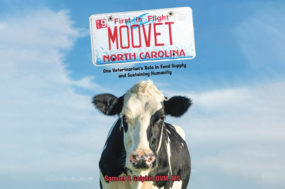Animal care is a big deal to dairy farmers. If cows aren’t happy, they don’t produce as much milk for everyone to enjoy. Which is why farmers spend a lot of time and effort making sure their cows have the right nutrition, environment and veterinary care.
Thanks to dairy industry professionals like Dr. Noa Roman-Muniz, farmers have access to solutions to constantly improve cow care. What sets her apart is a dedication to animals through people and their communications with each other.
Before Roman-Muniz became an associate professor and extension dairy specialist at Colorado State University (CSU), her passion for animals began at a young age. Her parents bought a dairy farm in her home country of Puerto Rico when she was 9 years old, where she enjoyed helping with chores. After Roman-Muniz graduated from vet school at the University of Wisconsin – Madison, she did an internship in food animal internal medicine and surgery at CSU’s Veterinary Teaching Hospital. There, she realized she was the only food animal veterinarian who could communicate with the Spanish-speaking dairy workers.
Since then, she has dedicated her research to focus on the connections between animal well-being and people who work on dairies. Her trainings cover everything from milking and feeding to cow care and disease prevention. Her goal is to “train the trainer” and give dairy supervisors the tools they need to effectively manage workers, which improves overall dairy success.
“If I can teach a supervisor how to teach their workers, I have all of those people taking care of cows the right way,” Roman-Muniz says. “I sleep better at night knowing I’m improving animal health by helping people.”
One of her areas of focus is giving dairy supervisors the tools they need to better communicate with employees of different cultures. Roman-Muniz also trains on motivating employees, teaching, providing feedback and conducting meetings. By conducting focus groups, she’s been able to hear about dairy workers’ challenges and help find solutions. She says, “I hope we’re giving a voice to a segment of the population that isn’t often seen or heard, and these are the people who are harvesting our food every day.”
Whether she’s in the classroom or on a dairy, Roman-Muniz is devoted to sharing the human side of where dairy products come from. By spending her time and research on improving work environments for dairy employees, she hopes to continue improving the lives of cattle on the farm.
“When I see that light bulb go on, that makes my day,” Roman-Muniz says. “It’s a difference in one life that will have an impact on many other lives.” ![]()
This article is brought to you courtesy of Dairy Max.
PHOTO: Dr. Noa Roman-Muniz combines her passions and skills to improve animal health by helping people as an associate professor and extension dairy specialist at Colorado State University. Photo courtesy of Dairy Max.




